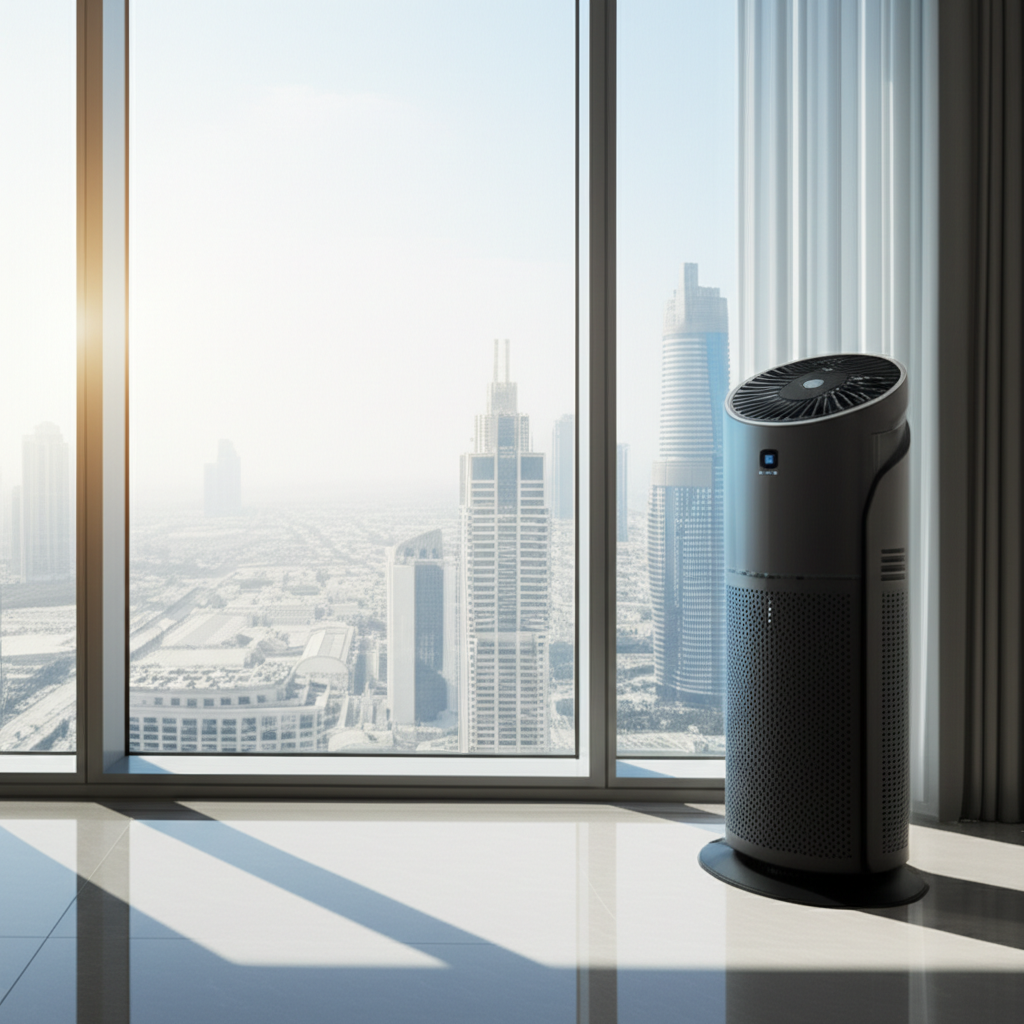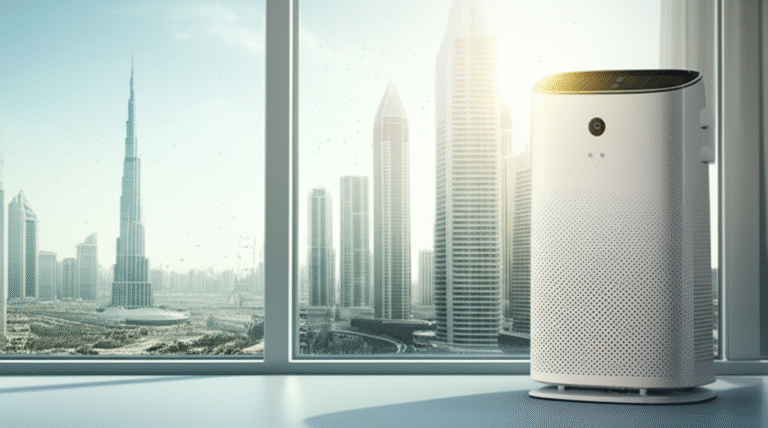Yes, an air purifier is highly recommended for Dubai homes. It effectively combats dust, allergens, and pollutants common in the desert climate, significantly improving indoor air quality for a healthier living environment.
Is an Air Purifier Needed in Dubai? Your Proven Solution for Cleaner Air
Living in Dubai is exciting, but the ever-present dust and airborne particles can be a real challenge for your home’s air quality. Many residents, especially those with allergies or respiratory concerns, often wonder if an air purifier is truly necessary. The good news is, it absolutely can be! We’ll guide you through why Dubai’s environment makes air purifiers a smart choice and how to pick the best one for your needs.
Contents
- 1 Understanding Dubai’s Unique Air Quality Challenges
- 2 Why an Air Purifier is a Smart Investment for Dubai Homes
- 3 How Air Purifiers Work: The Technology Behind Clean Air
- 4 Choosing the Right Air Purifier for Your Dubai Home
- 5 Top Air Purifier Brands and Models to Consider in Dubai
- 6 Setting Up and Maintaining Your Air Purifier
- 7 FAQs About Air Purifiers in Dubai
- 8 Conclusion: Breathe Easier in Dubai
Understanding Dubai’s Unique Air Quality Challenges
Dubai’s desert climate brings specific air quality concerns. Strong winds often carry fine sand and dust particles, which can easily enter homes and buildings. This isn’t just about visible dust; these particles can contain various allergens and pollutants.
The Impact of Dust and Sand
The fine particles, often referred to as PM2.5 (particulate matter less than 2.5 micrometers in diameter), are small enough to penetrate deep into your lungs. These can exacerbate conditions like asthma, allergies, and other respiratory issues. Even with regular cleaning, these microscopic particles settle on surfaces and circulate in the air.
Indoor Pollutants
Beyond outdoor dust, indoor activities also contribute to air pollution. Cooking, cleaning products, pet dander, and even volatile organic compounds (VOCs) from furniture and paints can degrade indoor air quality. In a city where spending time outdoors might be limited due to heat, ensuring your indoor air is clean becomes even more crucial.
Seasonal Variations
Certain times of the year, particularly during windy periods known as “Shamal” winds, see a significant increase in airborne dust. This makes the need for air purification more pronounced during these seasons.
Why an Air Purifier is a Smart Investment for Dubai Homes

An air purifier acts as a dedicated system to clean the air you breathe indoors. It’s like having a specialized filter for your entire home’s atmosphere, working continuously to remove harmful contaminants.
Health Benefits
- Allergy Relief: Effectively captures common allergens like pollen, dust mites, pet dander, and mold spores, providing significant relief for allergy sufferers.
- Asthma Management: By removing irritants like fine dust and smoke particles, air purifiers can help reduce asthma triggers and improve breathing.
- Improved Sleep: Cleaner air can lead to better sleep quality as your body doesn’t have to work as hard to breathe.
- Reduced Odors: Many air purifiers come with activated carbon filters that absorb and neutralize unpleasant odors from cooking, pets, or smoke.
Creating a Healthier Living Space
Beyond immediate health benefits, consistently clean air contributes to a generally healthier and more comfortable living environment. It reduces the burden on your body and helps maintain a fresher-smelling home.
How Air Purifiers Work: The Technology Behind Clean Air
Understanding how air purifiers function helps in choosing the right one. Most effective air purifiers use a multi-stage filtration system.
Key Filtration Stages
- Pre-filter: This is the first line of defense, capturing larger particles like hair, lint, and large dust clumps. It also protects the subsequent filters from getting clogged too quickly.
- HEPA Filter (High-Efficiency Particulate Air): This is the most critical filter. A true HEPA filter is certified to capture at least 99.97% of airborne particles as small as 0.3 micrometers. This includes fine dust, pollen, pet dander, mold spores, and bacteria.
- Activated Carbon Filter: This filter is designed to adsorb gases, chemicals, and odors. It’s excellent for removing VOCs from cleaning products, smoke smells, and cooking odors.
- Optional Additional Filters: Some purifiers may include UV-C light for germicidal irradiation or ionizers to help particles clump together, making them easier to capture. However, be cautious with ionizers, as some can produce ozone, which can be an irritant.
CADR: A Measure of Performance
When looking at air purifiers, you’ll often see a rating called Clean Air Delivery Rate (CADR). This measures how quickly an air purifier can clean the air in a room. Higher CADR ratings mean faster purification. It’s usually provided for dust, smoke, and pollen.
Choosing the Right Air Purifier for Your Dubai Home
Selecting the best air purifier depends on your specific needs and the size of your living space. Here’s a breakdown of what to consider:
1. Room Size and Coverage Area
Air purifiers are rated for specific room sizes. Always choose a unit that is designed for the square footage of the room you intend to use it in, or slightly larger, to ensure effective purification. Check the manufacturer’s specifications for recommended room coverage.
2. Filter Type
As discussed, a combination of a HEPA filter and an activated carbon filter is generally the most effective for tackling both particles and odors/gases. Ensure the HEPA filter is a “True HEPA” filter.
3. Noise Level
Air purifiers have fans that create noise. Check the decibel (dB) rating, especially if you plan to use it in a bedroom or living area where quiet is important. Lower dB ratings indicate quieter operation.
4. Energy Efficiency
Look for Energy Star certified models, which consume less electricity, saving you money on your utility bills. This is particularly relevant in Dubai where air conditioning usage is high, and you might be running the purifier for extended periods.
5. Maintenance and Filter Replacement
Filters need to be replaced periodically (usually every 6-12 months, depending on usage and air quality). Factor in the cost and availability of replacement filters when making your decision. Some units have filter indicator lights to remind you when it’s time for a change.
6. Additional Features
Consider features like multiple fan speeds, timers, air quality sensors (which automatically adjust the fan speed based on detected pollution levels), and smart connectivity (app control). While these can be convenient, they also add to the cost.
Top Air Purifier Brands and Models to Consider in Dubai
Several reputable brands offer effective air purifiers suitable for Dubai’s conditions. While specific models change, here are some popular brands known for quality:
| Brand | Key Features to Look For | Typical Benefits |
|---|---|---|
| Coway | True HEPA, Activated Carbon, Eco-friendly modes, quiet operation. | Excellent allergen and odor removal, good for bedrooms. |
| Philips | VitaShield IPS technology, HEPA and activated carbon filters, app control, allergen/bacteria/virus capture claims. | Comprehensive purification, smart features, effective against fine particles. |
| Dyson | Combines purification with fan/heater, HEPA and activated carbon, bladeless design, app connectivity. | Multi-functional, stylish design, good for year-round use, captures allergens and pollutants. |
| Blueair | HEPASilent™ technology, high CADR, energy efficient, sleek design. | Fast and quiet purification, good for larger rooms, energy saving. |
| Xiaomi | True HEPA, activated carbon, smart features (app control), often budget-friendly. | Good value for money, effective basic purification, connectivity. |
When purchasing, always check for local availability and warranty information in the UAE. Retailers like Sharaf DG, Carrefour, and major electronics stores in Dubai are good places to start your search.
Setting Up and Maintaining Your Air Purifier
Once you’ve purchased an air purifier, proper setup and regular maintenance are key to ensuring it performs optimally.
Initial Setup
- Unpacking: Carefully unpack the unit and remove all protective packaging, especially from the filters. Filters are often wrapped in plastic; ensure these are removed before operation.
- Placement: Position the air purifier in the room where you spend the most time or where air quality is a concern. Ensure there’s adequate space around the unit for air to circulate freely – avoid placing it directly against walls or furniture.
- Power On: Plug in the unit and turn it on. Familiarize yourself with the control panel and available settings.
Regular Maintenance
- Cleaning the Pre-filter: The pre-filter usually needs cleaning every 2-4 weeks. This can typically be done by vacuuming it gently or washing it with water (ensure it’s completely dry before reinserting).
- Replacing Filters: Follow the manufacturer’s recommendations for replacing the HEPA and activated carbon filters. This is usually every 6-12 months. Ignoring filter replacement significantly reduces the purifier’s effectiveness.
- Wiping Down the Unit: Periodically wipe the exterior of the air purifier with a damp cloth to keep it clean.
For detailed instructions, always refer to your specific air purifier’s user manual. You can often find these manuals online on the manufacturer’s website if you misplaced yours.
FAQs About Air Purifiers in Dubai
Q1: Do I really need an air purifier in Dubai if my home is always clean?
Yes, even in a clean home, microscopic dust, allergens, and pollutants are present in the air. Dubai’s climate means fine dust can easily enter, and indoor activities also create airborne particles. An air purifier actively removes these from the air you breathe.
Q2: Are air purifiers expensive to run in Dubai?
Modern air purifiers are generally energy-efficient, especially those with Energy Star ratings. While there is an electricity cost, it’s often comparable to running other appliances, and the health benefits can outweigh the running expense.
Q3: How often do I need to replace the filters?
Filter replacement frequency varies by model and usage, but typically HEPA and carbon filters need replacing every 6 to 12 months. Some units have indicator lights to remind you.
Q4: Can an air purifier help with the smell of smoke or cooking in my apartment?
Yes, air purifiers with activated carbon filters are excellent at adsorbing and neutralizing odors from smoke, cooking, pets, and other sources, leaving your home smelling fresher.
Q5: Which type of air purifier is best for allergies?
For allergies, a purifier with a True HEPA filter is essential, as it captures 99.97% of airborne allergens like pollen, dust mites, and pet dander. An activated carbon filter also helps remove associated odors.
Q6: Are ozone-generating air purifiers safe?
Ozone can be a lung irritant. While some purifiers use ozone to neutralize odors, it’s generally recommended to opt for ozone-free purifiers, especially if you have respiratory sensitivities. Look for units that explicitly state they do not produce ozone.
Conclusion: Breathe Easier in Dubai
Given Dubai’s unique environmental factors, investing in a quality air purifier is a proactive step towards ensuring a healthier and more comfortable living space. By understanding the challenges and the technology, you can confidently choose a unit that effectively tackles dust, allergens, and pollutants. Remember to consider room size, filter types, and ongoing maintenance to get the most out of your air purification system. With the right air purifier, you can significantly improve your indoor air quality and enjoy a breath of fresh air, right in your own home.


